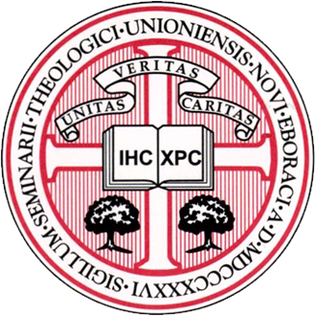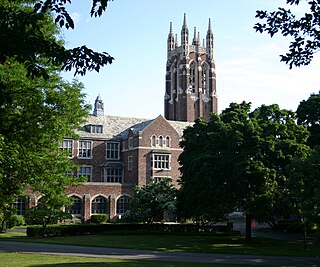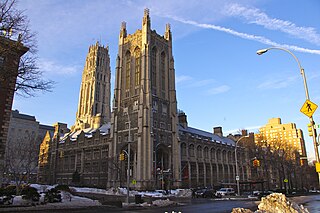Related Research Articles
Theology is the systematic study of the nature of the divine and, more broadly, of religious belief. It is taught as an academic discipline, typically in universities and seminaries. It occupies itself with the unique content of analyzing the supernatural, but also deals with religious epistemology, asks and seeks to answer the question of revelation. Revelation pertains to the acceptance of God, gods, or deities, as not only transcendent or above the natural world, but also willing and able to interact with the natural world and, in particular, to reveal themselves to humankind. While theology has turned into a secular field, religious adherents still consider theology to be a discipline that helps them live and understand concepts such as life and love and that helps them lead lives of obedience to the deities they follow or worship.

Charles Grandison Finney was an American Presbyterian minister and leader in the Second Great Awakening in the United States. He has been called the "Father of Modern Revivalism."

The African Methodist Episcopal Church, usually called the A.M.E. Church or AME, is a predominantly African-American Methodist denomination. It is the first independent Protestant denomination to be founded by black people. It was founded by the Rt. Rev. Richard Allen in Philadelphia, Pennsylvania, in 1816 from several black Methodist congregations in the mid-Atlantic area that wanted independence from white Methodists. It was among the first denominations in the United States to be founded on racial rather than theological distinctions and has persistently advocated for the civil and human rights of African Americans through social improvement, religious autonomy, and political engagement. Allen, a deacon in Methodist Episcopal Church, was consecrated its first bishop in 1816 by a conference of five churches from Philadelphia to Baltimore. The denomination then expanded west and south, particularly after the Civil War. By 1906, the AME had a membership of about 500,000, more than the combined total of the Colored Methodist Episcopal Church in America and the African Methodist Episcopal Zion Church, making it the largest major African-American Methodist denomination.

Charles Hodge was a Presbyterian theologian and principal of Princeton Theological Seminary between 1851 and 1878.

Union Theological Seminary in the City of New York (UTS) is a non-denominational Christian seminary in Morningside Heights, Manhattan, New York City. It is affiliated with neighboring Columbia University. Since 1928, the seminary has served as Columbia's constituent faculty of theology. In 1964, UTS also established an affiliation with the neighboring Jewish Theological Seminary of America.

Harvard Divinity School (HDS) is one of the constituent schools of Harvard University in Cambridge, Massachusetts. The school's mission is to educate its students either in the academic study of religion or for leadership roles in religion, government, and service. It also caters to students from other Harvard schools that are interested in the former field. HDS is among a small group of university-based, non-denominational divinity schools in the United States.

The American Academy of Religion (AAR) is the world's largest association of scholars in the field of religious studies and related topics. It is a nonprofit member association, serving as a professional and learned society for scholars involved in the academic study of religion. It has some 10,000 members worldwide, with the largest concentration being in the United States and Canada. AAR members are university and college professors, independent scholars, secondary teachers, clergy, seminarians, students, and interested lay-people.

Founded in 1855, the Chicago Theological Seminary (CTS) is the oldest higher education institution in the City of Chicago and was established with two principal goals: first, to educate pastors who would minister to people living on the new western frontier of the United States and second, to train ministers who would advance the movement to abolish slavery. Originally started under the direction of the abolitionist Stephen Peet and the Congregational Church by charter of the Illinois legislature, CTS has retained its forward-looking activist outlook throughout its history, graduating alumni who include civil rights activists Jesse Jackson Sr. and Howard Schomer, social reformer Graham Taylor, and anti-Apartheid activist John W. de Gruchy. It is one of six seminaries affiliated with the United Church of Christ and follows an ecumenical tradition that stresses cooperation between different Christian denominations as well as interfaith understanding.
Womanist theology is a methodological approach to theology which centers the experience and perspectives of Black women, particularly African-American women. The first generation of womanist theologians and ethicists began writing in the mid to late 1980s, and the field has since expanded significantly. The term has its roots in Alice Walker's writings on womanism. "Womanist theology" was first used in an article in 1987 by Dr. Delores Williams.. Within Christian theological discourse, Womanist theology emerged as a corrective to early feminist theology written by white feminists that did not address the impact of race on women's lives, or take into account the realities faced by Black women within the United States. Similarly, womanist theologians highlighted the ways in which Black theology, written predominantly by male theologians, failed to consider the perspectives and insights of Black women.. Scholars who espouse womanist theology are not monolithic nor do they adopt each aspect of Walker's definition. Yet, these scholars often find kinship in their anti-sexist, antiracist and anti-classist commitments to feminist and liberation theologies.

James Hal Cone (1938–2018) was an American theologian, best known for his advocacy of black theology and black liberation theology. His 1969 book Black Theology and Black Power provided a new way to comprehensively define the distinctiveness of theology in the black church. His message was that Black Power, defined as black people asserting the humanity that white supremacy denied, was the gospel in America. Jesus came to liberate the oppressed, advocating the same thing as Black Power. He argued that white American churches preached a gospel based on white supremacy, antithetical to the gospel of Jesus. Cone's work was influential from the time of the book's publication, and his work remains influential today. His work has been both used and critiqued inside and outside the African-American theological community. He was the Charles Augustus Briggs Distinguished Professor of Systematic Theology at Union Theological Seminary until his death.
Black theology, or black liberation theology, refers to a theological perspective which originated among African-American seminarians and scholars, and in some black churches in the United States and later in other parts of the world. It contextualizes Christianity in an attempt to help those of African descent overcome oppression. It especially focuses on the injustices committed against African Americans and black South Africans during American segregation and apartheid, respectively.
Garrett–Evangelical Theological Seminary (G-ETS) is a private seminary and graduate school of theology of the United Methodist Church. It is located in Evanston, Illinois on the campus of Northwestern University. The seminary offers a number of masters and doctoral-level degree programs in theology and promotes a wide range of programming through its academic Centers and Institutes. These include the Styberg Preaching Institute, the Stead Center for Ethics and Values, the Center for Ecological Regeneration, the Center for the Church and the Black Experience, the Hispanic-Latinx Center, the Center for Asian/Asian-American Ministry, and the Rueben P. Job Institute for Spirituality and Spiritual Formation.

Colgate Rochester Crozer Divinity School is a seminary in Rochester, New York affiliated with the American Baptist Churches USA. The school is progressive and ecumenical in theology, with Baptists, United Methodists, Presbyterians, Episcopalians and members of other denominations on its faculty and in its student body. The school also shares a partnership with Bexley Hall Seabury-Western Theological Seminary, an Episcopal seminary. It is accredited by the Commission on Accrediting of the Association of Theological Schools.
Gayraud Stephen Wilmore Jr. was an American writer, historian, ethicist, educator, and theologian, known for his role in the Civil Rights Movement and his scholarship related to the history of the African-American church and the history of African-American religious experience, as well as his contributions to black theology.
Katie Geneva Cannon (1950–2018) was an American Christian theologian and ethicist associated with womanist theology and black theology. She was the first African-American woman ordained in the United Presbyterian Church (USA), which occurred in 1974. She is credited with founding womanist theology and ethics as a field.
Stacey M. Floyd-Thomas is an American author and educator. She is Associate Professor of Ethics and Society at Vanderbilt Divinity School and the Graduate Department of Religion at Vanderbilt University in Nashville, Tennessee. Floyd-Thomas is a Womanist Christian social ethicist whose research interests include Womanist thought, Black Church Studies, liberation theology and ethics, critical race theory, critical pedagogy and postcolonial studies.

Jacquelyn Grant is an American theologian and Methodist minister who is one of the founding developers of womanist theology. She is currently the Callaway Professor of Systematic Theology at the Interdenominational Theological Center in Atlanta. Grant has written the book White Women's Christ and Black Women's Jesus (1989).
Marcia Y. Riggs is an American author, the J. Erskine Love Professor of Christian Ethics, and the Director of ThM Program at Columbia Theological Seminary, a womanist theologian, and a recognized authority on the black woman’s club movement of the nineteenth century. She was one of six Luce Scholars named by the Association of Theological Schools in the United States and Canada (ATS) and The Henry Luce Foundation, Inc. as Henry Luce III Fellows in Theology for 2017-2018.
This is a bibliography of works on Black theology.

Kenneth J. Collins is an American theologian and ordained minister in the United Methodist Church. He is a professor of Historical Theology and Wesley Studies at Asbury Theological Seminary. He is a leader in Wesley Studies, and his work The Theology of John Wesley: Holy Love and the Shape of Grace has been translated into Portuguese and Korean. He is the Director of the Wesleyan Studies Summer Seminar.
References
- ↑ "SSBR". Society for the Study of Black Religion. Retrieved 2016-03-06.CS1 maint: discouraged parameter (link)
- ↑ Paris, Peter J. (1991). "Overcoming Alienation in Theological Education". In Barbara G. Wheeler & Edward Farley (ed.). Shifting Boundaries. p. 183. ISBN 9780664251727.
- ↑ Rooks, Charles Shelby (1990). Revolution in Zion: Reshaping African American Ministry, 1960-1974 : a Biography in the First Person. Pilgrim Press. p. 134.
- ↑ Long, Charles H. (2003). "Assessment and New Departures for a Study of Black Religion". In Cornel West; Eddie S. Glaude (eds.). African American Religious Thought: An Anthology. p. 223.
- ↑ Paris, Peter J. (2014). "The African in African American Theology". The Oxford Handbook of African American Theology. p. 438. ISBN 9780199755653.
- ↑ Young, Henry J. (1979). Major Black Religious Leaders Since 1940. 2. p. 107.
- ↑ Encyclopedia of African American Religions. p. 409.
- 1 2 3 4 5 6 7 8 9 "Society for the Study of Black Religion: 42nd Annual Meeting" (PDF).
- ↑ "Bio: Emilie M. Townes". Vanderbilt University. Retrieved 2016-03-05.CS1 maint: discouraged parameter (link)
- ↑ "Dr. Stephen G. Ray, Jr. Named President-Elect of the Society for the Study of Black Religion". Garrett-Evangelical Theological Seminary.